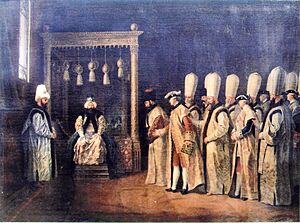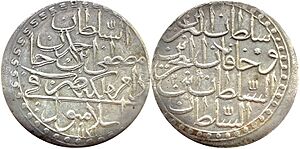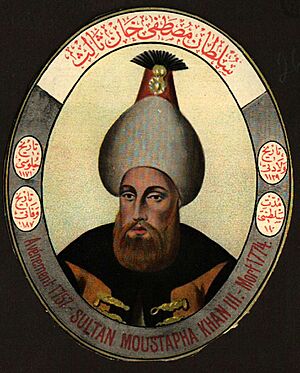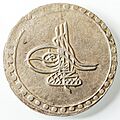Mustafa III facts for kids
Quick facts for kids Mustafa IIIمصطفى ثالث |
|||||
|---|---|---|---|---|---|
| Ottoman Caliph Amir al-Mu'minin Custodian of the Two Holy Mosques |
|||||
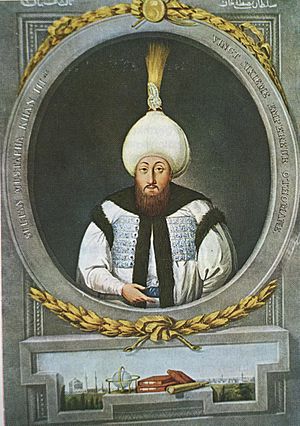 |
|||||
| Sultan of the Ottoman Empire (Padishah) | |||||
| Reign | 30 October 1757 – 21 January 1774 | ||||
| Predecessor | Osman III | ||||
| Successor | Abdul Hamid I | ||||
| Born | 28 January 1717 Edirne Palace, Edirne, Ottoman Empire |
||||
| Died | 21 January 1774 (aged 56) Topkapı Palace, Istanbul, Ottoman Empire |
||||
| Burial | Laleli Mosque, Fatih, Istanbul | ||||
| Consorts |
|
||||
| Issue Among others |
|
||||
|
|||||
| Dynasty | Ottoman | ||||
| Father | Ahmed III | ||||
| Mother | Mihrişah Kadın | ||||
| Religion | Sunni Islam | ||||
| Tughra |  |
||||
Mustafa III (born January 28, 1717 – died January 21, 1774) was the Sultan of the Ottoman Empire. He ruled from 1757 to 1774. Mustafa was the son of Sultan Ahmed III and his wife Mihrişah Kadın. After his death, his brother Abdul Hamid I became the next Sultan.
Contents
Early Life of Mustafa III
Mustafa was born in the Edirne Palace on January 28, 1717. His father was Sultan Ahmed III. His mother was Mihrişah Kadın. He had a brother named Şehzade Süleyman.
In 1730, his father, Sultan Ahmed III, was removed from power. This happened because of a revolt led by a man named Patrona Halil. Mustafa, his father, and his brothers were then kept inside the Topkapı Palace. In 1756, his older half-brother Mehmed died. This made Mustafa the next in line to become Sultan.
Mustafa III's Time as Sultan
Becoming Sultan
Mustafa became Sultan on October 30, 1757. He took the throne after his cousin Osman III passed away. Osman III was the son of Sultan Mustafa II.
How Mustafa III Ruled
Soon after becoming Sultan, Mustafa III showed he cared a lot about fairness. He worked to make Istanbul a better and richer city. He made rules for coins and built large places to store grain. He also made sure water systems worked well. He had strict rules about how the government's money was used.
Mustafa often traveled around his empire. He wanted to see if his laws were being followed.
Agreement with Prussia
Mustafa greatly admired Frederick the Great, the King of Prussia. Frederick was known for his military skills. In 1761, Mustafa made a peace agreement with Prussia. Frederick wanted an alliance against another powerful family, the Habsburgs. Mustafa wanted to make his country and army more modern.
Mustafa chose to get military officers from Berlin, Prussia, instead of Paris or London. These officers helped him to improve his army. In 1763, the Ottoman Empire and Prussia exchanged diplomats for the first time. This meant they sent official representatives to each other's countries.
War with Russia (1768–1774)
Koca Ragıp Pasha was the chief minister until 1763. He tried to keep peace with nearby countries. But Russia was becoming more powerful in the Caucasus region. Russia also wanted to control Poland. This caused problems between the Ottomans and Russia.
The next chief minister, Muhsinzade Mehmed Pasha, also wanted peace. But Mustafa insisted on going to war with Russia. He believed he could easily defeat them. This led to Muhsinzade Mehmed Pasha resigning in 1768. The Sultan thought the war would be quick and easy. However, the Ottoman army was not ready for a long fight.
During the war, military improvements were made. A French officer named François Baron de Tott helped with these changes. They updated the artillery, which are large guns. They also started a Naval Engineering School in 1773. This war was very difficult for the Ottoman Empire. Russian armies took control of Crimea, Romania, and parts of Bulgaria.
Buildings and Construction
Mustafa III oversaw many important building projects. The Fatih Mosque, first built by Mehmed the Conqueror, was completely rebuilt during his rule. He also had the Laleli Mosque complex constructed. He filled in the shore along Yenikapı to create a new neighborhood. Mustafa also started other building projects after big earthquakes in 1766 and 1767.
Mustafa III's Personal Life
Poetry
Mustafa III was also a poet. He wrote his poems using the pen name Cihangir.
Here is an example of his poetry: "This world has ruined, don't even think with us it recovers, It was the lousy fate that has delivered the power to vulgars, Now the perfidious ones have populated the Imperial Palace, It's now the mercy of the everlasting God that runs our business."
Mustafa III's Family
Mustafa III had several wives and many children.
Wives (Consorts)
Mustafa III had seven known wives:
- Aynülhayat Kadın: She was likely his first wife and had at least one daughter.
- Mihrişah Kadin: She was the mother of his son Selim III and at least two daughters.
- Fehime Kadın: She died during childbirth.
- Rifat Kadın: Mustafa met her while exploring Istanbul. She might be the mother of Şah Sultan.
- Ayşe Adilşah Kadin: She was the mother of two daughters.
- Binnaz Kadın: She did not have children.
- Gülman Hanim: Also known as Gülnar Hanim.
Sons
Mustafa III had at least two sons:
- Selim III (born 1761 – died 1808): His mother was Mihrişah Kadin. He later became the 28th Sultan of the Ottoman Empire.
- Şehzade Mehmed (born 1767 – died 1772): He passed away when he was young.
Daughters
Mustafa III had at least nine daughters:
- Hibetullah Sultan (born 1759 – died 1762): Her birth was a big celebration. She died young.
- Şah Sultan (born 1761 – died 1803): She had two biological daughters and one adopted daughter.
- Mihrimah Sultan (born 1762 – died 1764): Her birth was celebrated for five days. She died young.
- Mihrişah Sultan (born 1763 – died 1769): Her birth was celebrated for three days. She died young.
- Beyhan Sultan (born 1766 – died 1824): Her mother was Adilşah Kadin. She married and had a daughter.
- Hatice Sultan (born 1766 – died 1767): She died as a baby.
- Hatice Sultan (born 1768 – died 1822): Her mother was Adilşah Kadin. She married and had a son.
- Fatma Sultan (born 1770 – died 1772): She died when she was very young.
- Reyhan Sultan: She also died as a child.
Death of Mustafa III
Mustafa III passed away from a heart attack on January 21, 1774. He died at the Topkapı Palace in Istanbul. He was buried in his own tomb at the Laleli Mosque in Istanbul. His brother, Abdul Hamid I, became the next Sultan. When Mustafa died, the empire was facing many money and management problems.
Images for kids
See also
 In Spanish: Mustafá III para niños
In Spanish: Mustafá III para niños
 | Jewel Prestage |
 | Ella Baker |
 | Fannie Lou Hamer |


